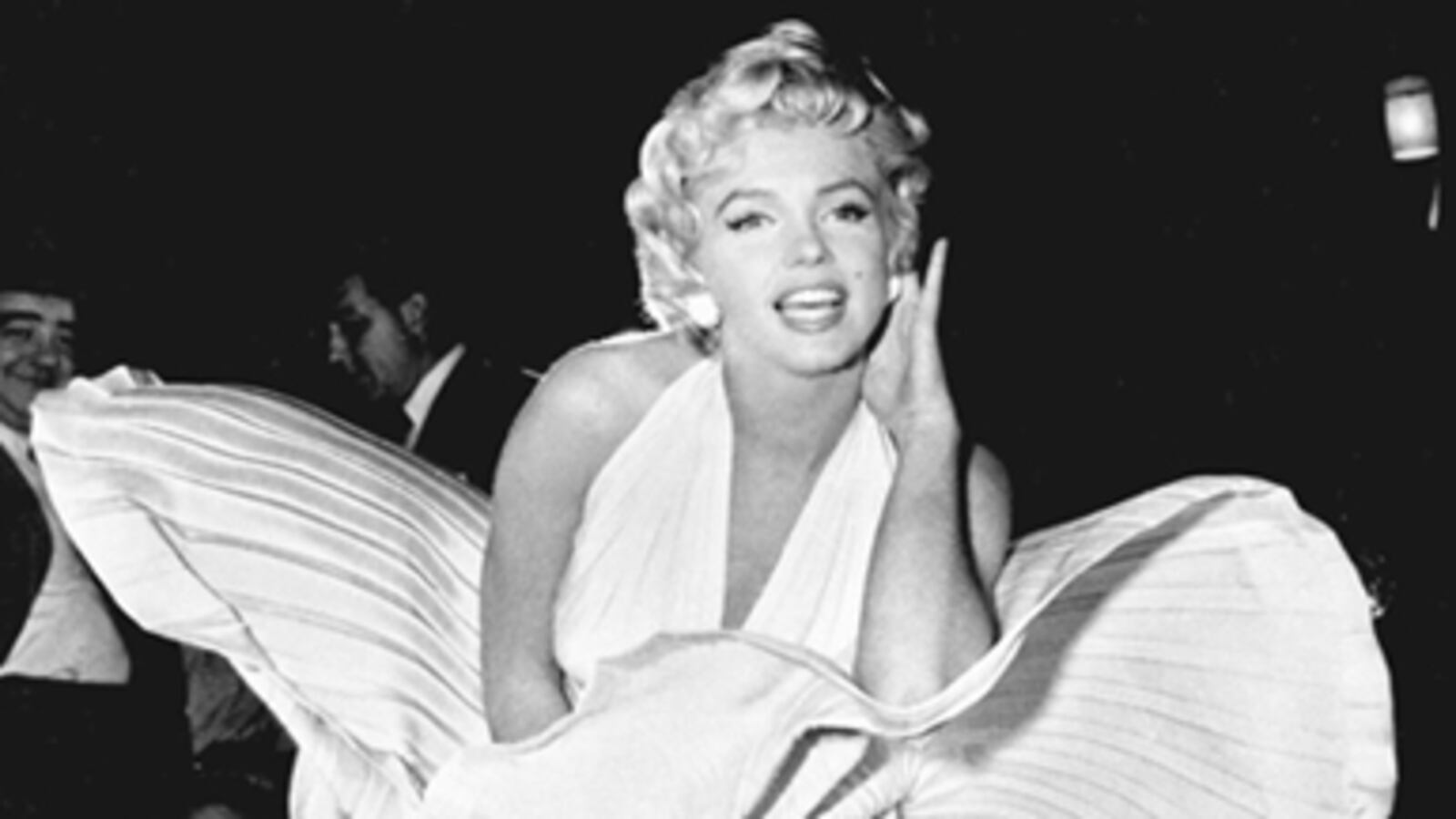When is a persona no longer indicative of the person behind it? To Elia Kazan and the American public, she was the “gayest girl,” but to her third husband Arthur Miller (and also, one assumes, to her various shrinks) she was “the saddest girl I’ve ever seen.” Since her ostensible suicide at the age of 36 in 1962, a slew of books about Marilyn Monroe have shed light on the fact that the real-life woman was far from the light-hearted tootsie she effected to be in most of her films. (The signal exceptions are Bus Stop and The Misfits, where desperation flickers in her eyes even when she’s smiling.) Yet none of them have managed to make the full extent of her psychological frailties quite so disturbingly apparent as Fragments, the recently published collection of Monroe’s jottings, poems, and letters that has been painstakingly put together by Stanley Buchthal and Bernard Comment from a recently discovered archive of her personal possessions.
If ever there was a creature haunted by the lasting damage of her early years, it was this blond bombshell. Beneath her radiant giggly geisha aura lay the insecurities and fears of an unwanted and possibly molested foster-child, one who had been brought up on strict Christian strictures and harsh discipline. (Monroe’s birth mother was a schizophrenic who went in and out of hospitals.) All the sex goddess fame that eventually came her way could not undo the sense of physical shame that had been instilled in her when she was still Norma Jean Baker—“my body is my body/every part of it,” she earnestly enjoins herself in a notebook from around 1955, having just noted two pages earlier that she was made to feel “afraid of my genitals.” Nor could it persuade her that she was a person worth taking notice of. Page 16 of the same notebook has five words written in Monroe’s slightly disjointed handwriting, with some of the letters crowded together and others spaced wide apart: “having a sense of myself.” Is she referring to the fact that she does, or doesn’t, have one? The rest of the notebook is blank, as though she has wearied of her own self-scrutiny.
This capacity for introspection was undoubtedly fed by years of psychoanalysis; still, according to the first document in this book, an “uncharacteristically typed” six-page journal-type entry written (as conjectured by the two editors) when Marilyn was 17 and recently married to Jim Dougherty, it was well in evidence before she met up with the Freudian couch. Despite the erratic spelling and lack of punctuation, her thinking about romance and its pitfalls is both clear and sophisticated. (In an undated fragment from a later section of the book she notes that “It must be that to a child of a dissatisfied woman/ the idea of monogamy is hollow”). Dougherty was five years her senior—they married when she was 16—and seems to have been less a soulmate than a means of staying out of the orphanage after her then-caretakers moved away from California. Monroe describes him none too enthusiastically as “one of the few young men I had no sexual repulsion for” (as opposed to her “suppressed idea of a dream man”) and alludes to the overwhelming insecurity that colored her choice. True to her later pattern of falling for cultured men, she was drawn to his “intellect” and his “love of classical music.” She refers to herself as an “intense introvert” who liked to lose herself in reading but also acknowledges the “agreeable or charming social patterns” that endear her to people. Soon enough, though, she reveals herself to be easily wounded (“I guess I’m to emotional in the wrong spots”), expressing “the numb pain of rejection and hurt” she felt when she suspected Dougherty of dallying with another woman. She ends this entry with a rueful bit of insight into the usefulness of illusions: “Its not to much fun to know yourself to well or think you do—everyone needs a little conceit to carry them through and past the fall.”

The themes of loneliness, sadness and disappointment—as well as a persistent, vague misanthropy (“I can’t really stand Human/Beings sometimes,” she writes in one of her poems)—run through many of the bits and pieces of writing collected here. One notebook begins on its inside cover with the stark declaration: “Alone!!!!!/ I am alone—I am always/ alone/no matter what.” (Facsimiles of the original documents are included in the book, as well as fetching photos of Marilyn reading, whether scantily dressed or wearing while gloves, having a go at Ulysess and Heinrich Heine.) She goes on to chronicle her lifelong panic about performing , ranging from her fear that she’ll fumble her lines to her deeper anxiety that the director “won’t think I’m any good.” Monroe projects her downcast state of mind onto others—“I saw a lot of lonely young/sailors who/they looked too / young to be so sad”—such that it is hard to tell at times whether she is being empathic or self-referential. There are many allusions to her “sensitivity” throughout, almost as though it were a separate entity that needed to be protected: “The sensitivy is so strong,” she writes, “—much deeper and stronger than that/ of Susie’s./ In fact, the sensitivity is so full and so strong it is dangerous.” Monroe reveals that the acting bug was always with her, that “as a small child” her “intact first desire was to be an actress.” Perhaps the years she spent “play acting” help account for the curious mixture of inwardness and performativeness that characterized her, the way she had of checking herself out in the mirror even as she was feeling distressed: The mouth makes me the saddest, next to my dead eyes.” Then again, surfaces count in her world more than they do in most; her looks have been her fortune and she is not about to forget it, not even when she’s wildly desperate after having been locked away in a psychiatric ward in Payne Whitney for three weeks in 1961 on the advice of her then-psychiatrist and threatening to cut herself with a piece of glass. In a long letter to her last analyst, Ralph Greenson, she recounts this incident only to humorously reassure him that she is a professional first to last: “I indicated if they didn’t let me out I would harm myself—the furthest thing from my mind at that moment since you know Dr. Greenson I’m an actress and would never intentionally mark or mar myself, I’m just that vain.”
One comes away from this book with a sense of profound loss—as well as great admiration for the many ways in which Monroe succeeded in warding off her demons.

There are many poignant moments in Fragments, bringing into more intense focus than ever before how much desolation Monroe had to fight against when she wasn’t resorting to all her razzle-dazzle tricks. “I am depressed with my whole life since I first remember,” she notes. And in another place she writes: “remembering when I couldn’t do a god/damn thing./ then trying to build myself up with the / fact that I have done things right that/ were even good and have had moments/ that were excellent but the bad is heavier/ to carry around and feel have no confidence….” Her abiding sense of emptiness is brought vividly home by a dream she describes in which Lee Strasberg and one of her psychiatrists are preparing her for surgery—“to cure me of this terrible dis-ease/ whatever the hell it is—“only to discover that there is nothing inside of her but “finely cut sawdust—like out of a raggedy ann doll.” The fact that she was able to put out as much in the way of entertainment value as she did notwithstanding is quite a tribute to both her native talent and her trained will. Perhaps the wonder is not that she was late to the set as often as she was (she was fired from her last movie, Something’s Got to Give, because of her repeated lateness and absences) but that she showed up at all.
Having said that, the dark side of Marilyn is not exactly a revelation. What does come as more of a surprise is the joyous, functioning Monroe that also leaps out of these pages. She is an avid student with a keen intellectual appetite, taking diligent notes on Renaissance art. She is an excellent reader of scripts, with an intuitive feel for where the focus of a narrative should be. Regarding The Misfits, she writes: “I feel the camera has got/ to look though Gay’s/ eyes whenever he is in a/scene and even when is/ not there still has to be a sense of/ him.” And, contrary to all the rumors of her ditzy sloppiness, she turns out to be quite the occasional Hausfrau, taking down recipes in great detail and organizing a dinner party down to the guest towels.
Gallery: Marilyn Monroe Look-A-Likes

A sudden chill enters the book about midway with the entry of someone named “Peter,” who the editors surmise might be the actor Peter Lawford, who was married to John Kennedy’s sister Pat. Monroe refers to “being afraid of Peter he might/ harm me, / poison me.” Her instincts were on the whole rather solid; Lawford would eventually introduce her to both his brother-in-law and Bobby Kennedy and Marilyn would go on to have affairs with both men, who may or may not have conspired in her death but who certainly didn’t leave her feeling happy.
That she was indeed capable of feeling happy—of being absorbed by both simple and more cerebral pleasures—as well as connected with great affection to those people she came to trust becomes eminently clear, making her frequent dips into anguish all the sadder to contemplate. One comes away from this book with a sense of profound loss—as well as great admiration for the many ways in which Monroe succeeded in warding off her demons, all of them suggestive of what she might yet have become had time been on her side. Fragments provides an intimate look at a complex woman, brimming with intelligence and awareness, who learned that boobs and breathiness were her calling card. It is hard to think of an equivalent actress today who would so earnestly engage in self-accounting and improving her mind. Now it is all twitter and branding and the dedicated cultivation of inauthenticity.
Goodbye, Norma Jean.
Plus: Check out Book Beast for more news on hot titles and authors and excerpts from the latest books.
Daphne Merkin was a staff writer for The New Yorker and is a contributing writer for The New York Times Magazine and Elle. She is the author of a novel, Enchantment, and a collection of essays, Dreaming of Hitler.






